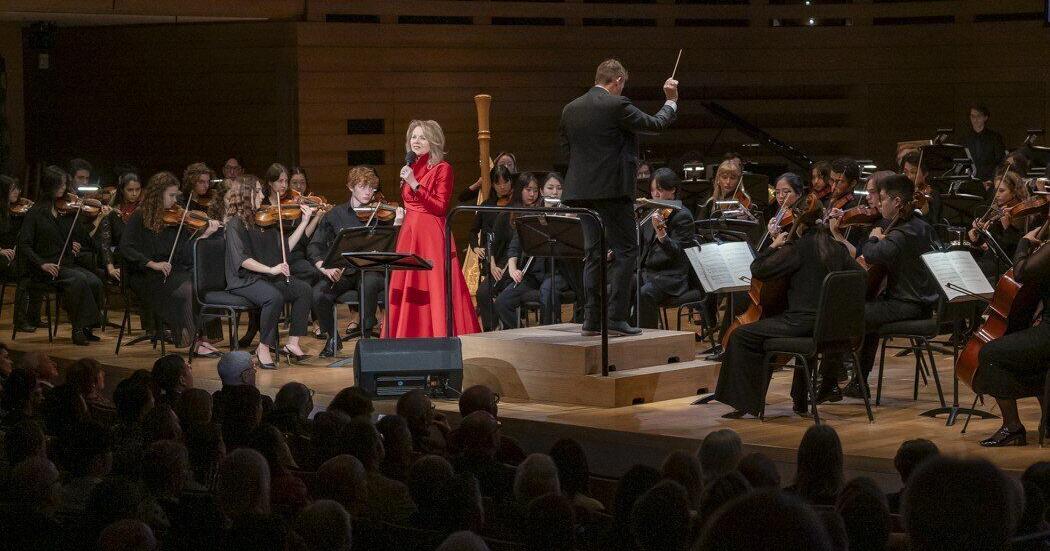Renée Fleming, the American soprano who’s known to draw sellout crowds wherever she performs, was warned she might be singing to an empty Koerner Hall on Saturday evening.
“My husband called earlier today and told me about that other event happening tonight,” she said wryly after stepping onto the stage, referencing the Blue Jays’ do-or-die seventh game of the World Series against the Los Angeles Dodgers.
Indeed, baseball was on the minds of many audience members and organizers during the special gala concert. When Alexander Brose, Royal Conservatory of Music president and CEO, introduced Fleming, he did so while sporting a Jays hat. During intermission, and again after the concert, those in attendance gathered in the lobby, eyes glued to a pair of TVs streaming the ball game.
But Fleming need not have worried. Despite the hubbub surrounding that “other event” several blocks to the south, Toronto audiences showed up for her, filling Koerner Hall almost to capacity. And in return, the operatic superstar delivered a performance that ended up being a much-needed balm for anxious — and later heartbroken — Jays fans.
It was a nearly two-hour program that was as varied and eclectic as Fleming’s career — one that has stubbornly defied categorization, straddling opera, musical theatre, jazz and even indie rock.
The first half was taken up by “Voice of Nature: The Anthropocene,” a series of orchestral songs and classical covers of pop hits, all accompanied by a National Geographic documentary screened onstage. Inspired by Fleming’s Grammy-winning album of the same name, the set of 11 pieces is astonishingly wide-ranging: from Handel and Burt Bacharach, to the Icelandic singer-songwriter Björk and “Lord of the Rings.”
Fleming possesses an ideal instrument for such an ecological meditation. Her voice, with its signature, soothing warmth, is mother nature personified. And there’s a suppleness to the way she glides between notes that makes it feel as if she’s caressing the music.
That’s not to say, however, that this was a perfect performance. Fleming, who sang both unamplified and with a microphone for certain songs, occasionally sounded less secure performing some of the non-classical pieces like Bacharach and Hal David’s “What the World Needs Now Is Love” — with the melody sitting awkwardly between her head and chest voices.
The Royal Conservatory Orchestra, under the steady direction of conductor Robert Moody, provided a full-bodied backing, even if at times the woodwinds overpowered the soloist.
After intermission, Fleming switched out of her red gown and stepped into a resplendent gold dress. She opened the second half with a pair of arias from the Handel oratorios “Samson” and “Alexander Balus,” showcasing her light, agile voice. She later followed it up with a pair of songs by Strauss.
In between, the spotlight shifted to the orchestra, which performed the overtures to both Beethoven’s opera “Fidelio” and Rossini’s “The Barber of Seville.” The former, filled with majestic, melodic bursts, was performed with enthusiasm, the intensity rippling like a current from the strings, and into the woodwinds and brass.
The Rossini overture, however, lacked the necessary forward momentum that the material calls for. While Moody coaxed a phenomenal range of dynamics out of the orchestra, the strings played the main theme with a longer than usual bow stroke, leaving the bouncing melody to feel surprisingly sluggish.
Afterwards, Fleming returned once again, concluding the program with a scintillating rendition of Puccini’s “O mio babbino caro.” For that, Fleming received a lengthy ovation, which she eventually cut off with a raised hand and a smile. “I’m rushing you because I know we all want to watch the game,” she said with a laugh.
Then Fleming ended the night with a pair of encores, as if preparing Jays fans in the audience for two vastly different outcomes. The first song: the jubilant and celebratory number “I Could Have Danced All Night” from the musical “My Fair Lady.” And the second: the far more melancholic solo “Morgen!” by Strauss.
“Tomorrow the sun will shine again, and on the way that I will go,” Fleming sang in German, her gentle voice cradling the audience — as if bracing us for the heartbreak to come.



